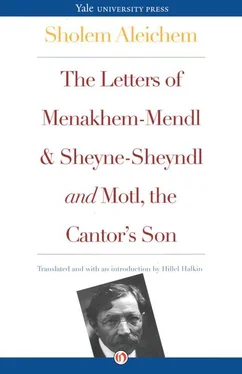“No,” said the tailor from Heysen with a triumphant sneer. “They’re not going to salt us away. They’re going to take us to a place called Ella’s Island and pen us up there like calves until someone comes to get us out.”
Pinye didn’t let that pass in silence: “Get a load of this tailor boy! He’s a regular fountain of bad news. There’s nothing he doesn’t know. Who hasn’t heard of Ella’s Island? And who doesn’t know it’s an island and not a cattle pen?”
The hotter under the collar Pinye became, the more the tailor from Heysen feared for his life. In the end he backed off and turned away, although not before grumbling: “Well! Just imagine! You would think I had stained his best suit! Dared criticize his precious America! Pshaw! Just wait a while and you’ll see …”
You can’t blame Pinye for being so annoyed at Ella’s Island that he’s writing a poem about it while fighting all the time with Elye. Mostly, though, he keeps his disappointment with America to himself. He doesn’t want the tailor to see it. But he’s burning up inside, even if he keeps a stiff upper lip. “How can it be?” he asked Elye in a low voice when we were taken to Ella’s Island. “Where do you get off locking people up like so many criminals?” The tailor from Heysen was right.
Actually, it isn’t as bad as all that. Not only are we not in a cattle pen, we’re in a big bright building with plenty of free food and drinks. We couldn’t be treated any better.
Until we got here, though — whew! One by one we had to walk a long hallway with lots of doors on each side. At each door we were stopped by some grouch with shiny buttons who double- and triple-checked us. The first held our eyelids open with a slip of cardboard while examining our eyes. Then the others examined the rest of us. They marked us with chalk and signaled us to go right or left. When all the lefts and rights were finished we came to the big building and started to look for each other. We had gotten separated in the confusion and really were as scared as calves bound for the slaughterhouse.
Scared of what? Mainly of my mother’s eyes. They were still red from crying. Wouldn’t you know that in the end they were hardly looked at!
“That’s your blessed father helping from heaven. The light shine on him in Paradise!”
So my mother said, hugging us and crying for joy. She was so happy she didn’t know what to do with herself.
Elye acted like a new man. All the time we had been on the road, he took his worries out on me. The slaps flew like chips of wood while Brokheh cheered him on. Now he was a different person. He even gave me an orange from his pocket. Everyone on the Prince Albert was given an orange every morning. Some stuck theirs in their pockets for later. Not me. Who could resist eating it right away?
Pinye was good and proud of himself. He said:
“Well? Who was right? Didn’t I tell you all those stories about being sent back for crying were spread by America’s enemies? A bunch of fat-mouthed, lying, hot-aired, no-good bums! It wouldn’t surprise me to hear them say that all Jews in America had to be baptized. Where’s that damned tailor from Heysen?”
Pinye and America were friends again.
In all the commotion no one had noticed that one of us was missing. That was my friend Mendl. The first to realize it was Brokheh. She clapped her head and said:
“Oh my God! Where is Teeny?”
“Lord almighty!” cried my mother. We jumped up to look for him, but Mendl was nowhere to be found. He might as well have fallen overboard.
Later we learned it was his own fault. He had been tripped up in the questioning. At first he played deaf and dumb the way he had in Germany. Then he talked a lot of malarkey. One minute he said he was ten, the next thirteen, and the next he broke down and told the truth — which was that he was lost. That is, his parents had lost him in Germany and we had adopted him. He didn’t even know their address. Not that he was asking for any favors. He would find them himself. He knew what they looked like and he would recognize them.
Now Mendl was being held in a room with some other boys who would all be sent back to Europe.
As soon as we heard the news, we rallied to Mendl’s side. My mother raised a cry. The immigration officials, she said, would be responsible for making Mendl an orphan. What would they tell his parents when they met them?
“Take a deep breath,” advised the tailor from Heysen. “You’re not out of the woods yet yourselves.”
“Well, well, if it isn’t Haman again!” Pinye declared. He looked about to go for the tailor’s throat. The tailor pretended not to notice. You would think he had been asked to give a public address, the way he piled stone after stone on our hearts with each trouble ahead that he listed. First, he said, we would be asked the names of friends and acquaintances. Then we would have to shell out money for telegrams and wait for them to come. We wouldn’t be released until they vouched for us and signed a guarantee.
Naturally, Pinye exploded. With a glance at Elye he asked the tailor how come he was such an expert on Ella’s Island. The tailor replied that he was an expert because he had met an emigrant aboard ship who had been to America three times.
He must have meant the old sea hand. He’s picked up all kinds of tidbits from him. He can even speak English and is already half an American. “Tshikn”—“kitshn”—“shuggeh”—“misteh”—“butsheh”—“bridzh”: those are just some of the words he knows. He won’t tell us what they mean, though. He says we’ll have to find out for ourselves. Pinye waved a hand and walked away as if to say: “Let the dog bark if it wants to.”
Don’t think that tailor from Heysen didn’t know what he was talking about. He had it right down to the last detail. After getting the third degree from the doctors, we were asked who we knew in America. “Who don’t we?” my mother answered, eager to list all our friends and acquaintances. She’s a pleasure to look at now that they’ve let her in. She glows like a young woman. I haven’t seen her this way in ages.
My brother Elye interrupted. He should do the talking, he said, because he had the addresses written on a piece of paper. That made Pinye declare that the officials wanted names, not addresses. Brokheh cut Pinye short. Both the names and addresses, she told him, belonged to our friends, not his. Pinye got sore. “Since when are Fat Pesye and Moyshe the bookbinder more your friends than mine?” he wanted to know. “I don’t give a damn about Pesye,” Brokheh said. “I’m talking about my father, Yoyneh the baker.”
Elye was right. They wanted addresses, not names. The fun and games began all over again.
Naturally, when it comes to reading addresses Pinye thinks he’s a world beater. He grabbed the paper from Elye, plastered it to his nose, and read aloud like a chanting rabbi. No one understood a word, especially since it all came out backwards. Elye snatched the paper back and handed it to a Shiny Buttons. The Shiny Buttons looked at it and said: “Awl reit.” No one knew what that meant except the tailor from Heysen. Awl, he explained, meant everything and reit meant to write. In short, everything was written on the paper.
We shelled out change for two telegrams. One went to Moyshe and Pesye and the other to Yoyneh. Then we sat down to breakfast. The food wasn’t so hot. Brokheh said the tea could be eaten with a soup spoon. Still, it was free. Everything is free on Ella’s Island. At least we weren’t waiting on an empty stomach.
Waiting was easier said than done. Our eyes were falling out by the time we saw our first acquaintances. They were Pesye and Moyshe. I mean we didn’t exactly see them, because we were in detention. We were told that a fat woman and her husband had come for us. It was maddening not to see them while they were being grilled outside. Someone suggested bribing a guard to have a look. Pinye said America wasn’t Russia. In America, he said, there were no bribes. “When it comes to bribes,” said the tailor from Heysen (there was nowhere that man didn’t turn up), “America and Russia are the same town. The rabbis say that money can even buy a father for a bastard.” For once Pinye had no answer.
Читать дальше












